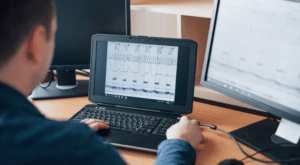Nutrition plays a critical role in the outcome of lie detector tests. The foods that you eat (or whether you eat anything at all) before a polygraph exam can impact the accuracy of the test results.
As taking a polygraph exam often means your reputation is on the line, the last thing you want is to fail the test on account of poor dietary choices. Therefore, it’s imperative to mind your nutrition while preparing for a lie detector test.
Let’s delve into the ideal pre-polygraph nutrition and what to avoid when preparing for these important evaluations.

What Do Polygraphs Measure?
Polygraphs measure changes in various involuntary bodily functions, including breathing, heart rate, and skin conductivity. These physiological processes are controlled by the Autonomic Nervous System (ANS).
The ANS has two divisions, namely the Sympathetic Nervous System and the Parasympathetic Nervous System. An individual’s responses to lie detector questions may impact both ANS divisions, albeit differently.
What’s The Relationship Between Deception and the ANS?
Lying is a self-defense mechanism.
When you’re about to tell a lie, there’s a change in your blood pressure. The same goes for your breathing rate and skin conductivity.
These reactions occur spontaneously as you anticipate the imminent danger, which is the need to respond physically to the questions.
Since the autonomic nervous system regulates most of the physiological functions impacted by deception, lying directly activates the ANS. As the danger increases, your brain signals the ANS to stay aroused. This results in dramatic shifts in the ANS-controlled reactions.
How Nutrition Impacts the ANS
Food intake can affect both the sympathetic and parasympathetic divisions of the autonomic nervous system.
Emerging research suggests that certain dietary fats may modulate autonomic responses through vagal afferent signaling, although these effects are not fully understood in the context of lie detection.
One experiment found that dietary lipids may fire up the autonomic nervous system through afferent vagal nerve fibers.

Why Proper Diet Matters Before Undergoing A Polygraph Test
Lie detector tests are not very pleasant experiences. In jurisdictions where polygraphs are legally admissible, failing certain lie detector evaluations – such as criminal defense polygraphs – may have you wrongly convicted of an offense.
Some examinees may deploy dishonest tactics known as countermeasures to try to beat lie detector tests. However, experts warn against such interventions.
Your best bet is to remain truthful throughout the examination.
But simply replying truthfully to polygraph questions may not help clear your name. In-depth preparation is equally paramount.
A significant part of the planning process entails taking a proper diet ahead of each lie detector test.
What Are The Dietary Best Practices Before Taking A Polygraph Test?
1. Remember To Eat
Avoid taking a polygraph test on an empty stomach. Low blood sugar from skipping meals can trigger physical symptoms, such as sweating, rapid heartbeat, or dizziness — all of which may interfere with the autonomic nervous system responses that polygraph instruments monitor.
An altered ANS can present various physiological symptoms, including those typically monitored by polygraph machines. That makes it challenging for examiners to infer whether an elevated heart rate is due to deception or sheer hunger.
In the same vein, drink plenty of water before a scheduled polygraph test. Research has found that hydration can modulate the sympathetic nervous system, preventing spikes in polygraph-monitored physiological functions.
2. Eat a Balanced Diet
The significance of consuming a balanced diet has been impressed upon us right from the third grade. Besides supporting healthy growth and development, eating a balanced diet can also impact the outcome of a lie detector test.
Proper nutrition nourishes the autonomic nervous system and helps it maintain normal homeostasis. It also minimizes stress and inflammation, which can impact normal ANS functioning.
Prioritize energizing foods like whole nuts, leafy vegetables, fresh fruits, seafood, and herbal drinks. Conversely, avoid highly processed or refined products.

3. Eat Normally
It may be tempting to overindulge in food before heading into a lie detector room. But just like hunger, overeating can disrupt your homeostatic balance and potentially alter your ANS-regulated functions.
So, remember to eat normally ahead of a polygraph test.
If the exam is scheduled several hours after taking your main meals, it’s still prudent to consume a small amount of food.
4. Know What to Avoid
Excess Sugar
Shun sugary foods on polygraph’s D-Day. While low blood sugar levels can impact your concentration during a lie detector evaluation, a change in blood sugar can equally disrupt the autonomic nervous system and trigger reactions consistent with deception.
Spices
Spicy foods may also arouse the ANS and cause a polygraph machine to misread genuine responses to polygraph questions.
Caffeinated Beverages
Caffeine is a stimulant noted for its ability to fire up the nervous system. You can consume it in moderation before the exam. On the flip side, it can even be helpful in some cases to maintain alertness during the procedure.

Observing Polygraph Nutritional Dos and Don’ts
We cannot overemphasize the significance of proper nutrition while preparing for a lie detector test. Certain foods can arouse your autonomic nervous system, potentially elevating the physiological reactions typically measured by polygraph machines.
A good practice is to consult a licensed polygraph examiner on proper nutritional guidelines before taking a lie detector test.
Besides nutrition, strive to implement other healthy lifestyle habits while preparing for a polygraph test. These include getting a good night’s sleep, shunning recreational drugs, and wearing comfortable clothing.






